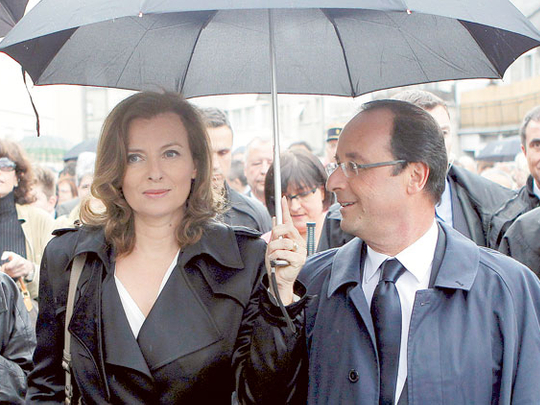
London: French President Francois Hollande makes his first official visit to London on Tuesday with splits over City regulation, the Euro crisis and high-income taxation set to dominate talks with David Cameron.
Despite the pair’s ideological differences — the British prime minister did not want to meet Hollande during his election-campaign visit in February — it is expected the two men will work together on more consensual issues.
The leaders are scheduled to hold a meeting and a working lunch on Tuesday followed by a joint press conference.
Conservative Cameron and Socialist Hollande held their first bilateral meeting before the G8 summit in Washington in May.
“I did not meet David Cameron before the election, so I am especially pleased to meet him afterwards,” said Hollande at the time.
Tuesday’s discussions will focus on “a broad spectrum of topics”, according to a brief statement released by Cameron’s Downing Street office.
Paris said the focus would be on “the Franco-British partnership”, highlighting bilateral cooperation on defence and energy and on international issues such as Syria, Iran and Mali.
But Cameron’s controversial promise made last month to “roll out the red carpet” for any French tax exiles, will not be on the agenda. The French leader shrugged off the comments as “of no importance”.
Taxation in France, however, is also being closely scrutinized by the British government on another point: a proposed hike in the levy on foreign-owned second homes.
According to the Daily Telegraph, this measure could affect “some 200,000 British second-home owners in France”, and London would be willing to “challenge any proposal which breaches European single market laws and anti-discrimination rules.”
European issues are also likely to elicit a difference of opinion.
Cameron continues to urge members of the eurozone - of which Britain is not a part - to take action to resolve the economic crisis that is severely affecting his country’s economy.
But under heavy pressure from the Eurosceptic wing of his party, he recently called for “less Europe”, and has not ruled out a referendum on whether Britain should redefine its relationship with Brussels.
He also refused to back the European Pact on fiscal discipline, which he fears may compromise the City of London’s position as Europe’s leading financial centre, and has regularly voiced his fierce opposition to a financial transactions tax desired by Paris.
Last November, he speculated in front of Britain’s parliament whether the French would accept “a tax on cheese.”
Hollande responded in May by suggesting that “the British have been particularly shy about the issues of financial regulation, and attentive only to the interests of the City”.
He also deplored London’s “relative indifference” to the fate of the euro area.
“Europe is not a cash till and less still a self-service restaurant,” he quipped in an apparent dig at Cameron.
In contrast, the British leader appeared to distance himself from attacks on Hollande by the conservative press by insisting there was “no contradiction between austerity and growth”, a position advocated by the French president.
He also pointed out that Hollande’s timetable for balancing the budget was tighter than Britain’s.
During his one-day visit, Hollande will also meet members of the sizeable and influential French community in London.
With a French population estimated at around 350,000, the British capital is sometimes called “the sixth French city”.












